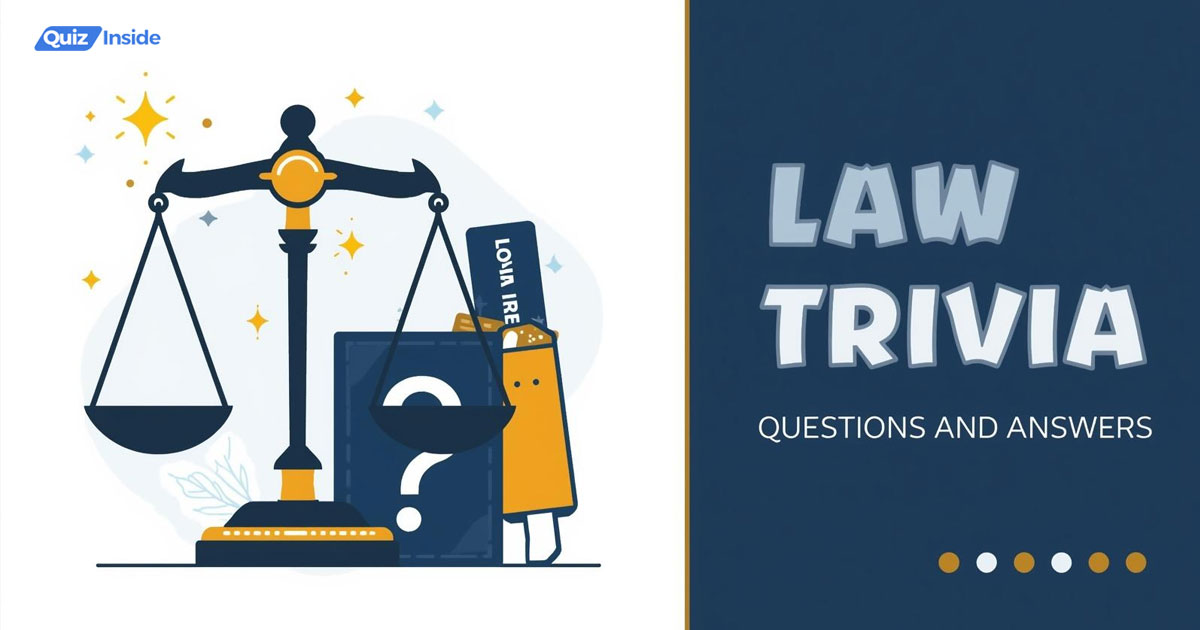Law trivia questions test your knowledge of legal history, landmark cases, and quirky courtroom facts, making learning about the legal world both fun and engaging.
Introduction
The world of law is often seen as serious, complex, and reserved for judges, lawyers, and scholars. However, legal history is full of fascinating facts, surprising rulings, and unique traditions that make excellent trivia questions. From unusual old laws still on the books to famous courtroom battles that shaped nations, law trivia questions are a fun way to explore this vast subject.
In this post, we will dive deep into interesting law trivia questions, organized in a way that is easy to follow and enjoyable to read. Whether you are a student preparing for a legal quiz, a trivia night enthusiast, or simply curious about the legal system, you’ll find plenty of engaging questions and answers here.
Law Trivia Questions And Answers

Ancient and Historical Law
Laws have shaped societies since ancient times. This section explores the earliest forms of law, from Hammurabi’s Code to Roman law.
Q: What is considered the oldest known written legal code?
A: The Code of Hammurabi
Q: In ancient Rome, what was the name of the set of laws inscribed on bronze tablets?
A: The Twelve Tables
Q: Which ancient civilization introduced trial by jury?
A: Ancient Greece
Q: Who is known as the “Father of Roman Law”?
A: Cicero
Q: What type of punishment was common under Hammurabi’s Code?
A: Eye for an eye justice
Q: What was the purpose of the Magna Carta in 1215?
A: To limit the king’s power and protect certain rights of nobles
Q: Which English king signed the Magna Carta?
A: King John
Q: What is the term for laws passed by the Roman Senate?
A: Senatus consulta
Q: In early English law, what was a “trial by ordeal”?
A: A test of guilt through painful or dangerous tasks
Q: Which famous philosopher wrote Politics and discussed law and governance?
A: Aristotle
Constitutional Law
Constitutional law defines the framework of government and citizens’ rights. These questions test knowledge of famous constitutions and their principles.
Q: What year was the U.S. Constitution signed?
A: 1787
Q: How many amendments does the U.S. Constitution currently have?
A: 27
Q: What is the first amendment to the U.S. Constitution about?
A: Freedom of speech, press, religion, assembly, and petition
Q: Which branch of government interprets the Constitution?
A: Judicial branch
Q: What document served as the U.S. Constitution’s predecessor?
A: The Articles of Confederation
Q: In India, when did the Constitution come into effect?
A: January 26, 1950
Q: What is the principle of “separation of powers”?
A: Dividing government authority among legislative, executive, and judicial branches
Q: Which landmark U.S. case established judicial review?
A: Marbury v. Madison (1803)
Q: Who is often called the “Father of the U.S. Constitution”?
A: James Madison
Q: Which amendment lowered the U.S. voting age to 18?
A: The 26th Amendment
Criminal Law
Criminal law governs offenses against society. This section covers crimes, punishments, and legal principles in criminal justice.
Q: What is the Latin phrase meaning “guilty mind,” essential in proving criminal liability?
A: Mens rea
Q: What does the term “felony” mean?
A: A serious crime, usually punishable by imprisonment over a year
Q: What is the opposite of a felony?
A: A misdemeanor
Q: Which U.S. amendment guarantees the right to a speedy trial?
A: The 6th Amendment
Q: What is “double jeopardy”?
A: Being tried twice for the same crime
Q: What is the crime of intentionally lying under oath?
A: Perjury
Q: What is the term for unlawfully killing someone without premeditation?
A: Manslaughter
Q: In criminal law, what is an “alibi”?
A: Evidence that the accused was elsewhere at the time of the crime
Q: What does “beyond a reasonable doubt” mean?
A: The standard of proof required for a criminal conviction
Q: Which international court handles crimes against humanity?
A: The International Criminal Court (ICC)
Civil Law
Civil law governs disputes between individuals and organizations. These questions cover contracts, property, and damages.
Q: What is the main difference between civil and criminal law?
A: Civil law deals with private disputes; criminal law deals with offenses against the state
Q: What is the typical remedy in civil cases?
A: Monetary compensation (damages)
Q: What is a “tort”?
A: A wrongful act causing harm to another person, leading to civil liability
Q: What does “liable” mean in civil cases?
A: Legally responsible
Q: What is a breach of contract?
A: Failure to fulfill contractual obligations
Q: What is “negligence”?
A: Failure to exercise reasonable care, resulting in harm
Q: In property law, what does “landlord” mean?
A: The owner who rents property to a tenant
Q: What does “defamation” mean?
A: False statements that harm someone’s reputation
Q: What is the legal term for breaking a promise in a contract?
A: Breach
Q: What does “injunction” mean in civil law?
A: A court order requiring someone to do or stop doing something
International Law
International law governs relations between nations and organizations worldwide. This section highlights treaties, courts, and global principles.
Q: What is the main purpose of international law?
A: To regulate relations between countries
Q: Which organization is responsible for maintaining international peace and security?
A: The United Nations (UN)
Q: What is the “Geneva Convention” primarily about?
A: Humanitarian treatment during war
Q: What city hosts the International Court of Justice?
A: The Hague, Netherlands
Q: What does “sovereignty” mean in international law?
A: The authority of a state to govern itself
Q: What is diplomatic immunity?
A: Protection given to diplomats from prosecution in host countries
Q: Which international treaty regulates climate change?
A: The Paris Agreement
Q: What is the International Criminal Court’s main role?
A: To prosecute war crimes, genocide, and crimes against humanity
Q: Which treaty established the European Union?
A: The Maastricht Treaty
Q: What does “extradition” mean?
A: Surrendering a person accused of a crime to another country
Famous Legal Cases
Landmark cases often redefine laws. These questions focus on influential rulings in different parts of the world.
Q: Which U.S. Supreme Court case ended racial segregation in schools?
A: Brown v. Board of Education (1954)
Q: What case established Miranda rights in the U.S.?
A: Miranda v. Arizona (1966)
Q: Which case legalized same-sex marriage in the U.S.?
A: Obergefell v. Hodges (2015)
Q: What was Roe v. Wade about?
A: Legalization of abortion rights (1973)
Q: In which case was Richard Nixon ordered to hand over tapes during Watergate?
A: United States v. Nixon (1974)
Q: Which case upheld the Affordable Care Act’s individual mandate?
A: National Federation of Independent Business v. Sebelius (2012)
Q: What case established “separate but equal” doctrine in 1896?
A: Plessy v. Ferguson
Q: What was the Dred Scott v. Sandford case about?
A: Slavery and citizenship rights
Q: Which case limited presidential powers during wartime?
A: Youngstown Sheet & Tube Co. v. Sawyer (1952)
Q: Which famous case involved O.J. Simpson?
A: The People of the State of California v. O.J. Simpson (1995)
Lawyers and Legal Profession
The legal profession is full of traditions, terms, and famous figures. This section covers lawyers, judges, and their roles.
Q: What is the Latin term for “friend of the court”?
A: Amicus curiae
Q: What do you call a lawyer who represents the government in criminal cases?
A: Prosecutor
Q: What is the difference between a barrister and a solicitor in the UK?
A: Barristers represent clients in court; solicitors handle legal paperwork and advice
Q: What is required to practice law in the U.S.?
A: Passing the bar exam
Q: Who was the first female U.S. Supreme Court Justice?
A: Sandra Day O’Connor
Q: What is “pro bono” legal work?
A: Free legal services for the public good
Q: What is the title for the highest-ranking judge in the U.S.?
A: Chief Justice of the Supreme Court
Q: What is “cross-examination”?
A: Questioning the opposing party’s witness in court
Q: Who defends clients accused of crimes?
A: Defense attorney
Q: What is “legal ethics”?
A: Rules governing professional conduct of lawyers
Legal Terms and Latin Phrases
Law is full of Latin expressions and unique terminology. This section explores common legal words and maxims.
Q: What does “habeas corpus” mean?
A: You shall have the body (a writ requiring a person’s release unless lawful grounds exist)
Q: What does “pro bono publico” mean?
A: For the public good
Q: What does “subpoena” mean?
A: A court order to appear or produce evidence
Q: What does “bona fide” mean?
A: In good faith
Q: What does “quid pro quo” mean?
A: Something given in exchange for something else
Q: What does “stare decisis” mean?
A: To stand by decided cases (precedent)
Q: What does “in loco parentis” mean?
A: In place of a parent
Q: What does “ultra vires” mean?
A: Beyond one’s legal power or authority
Q: What does “prima facie” mean?
A: At first sight; based on initial evidence
Q: What does “res ipsa loquitur” mean?
A: The thing speaks for itself
Legal Systems Around the World
Different countries follow different legal traditions. This section looks at law globally.
Q: What are the two main types of legal systems in the world?
A: Common law and civil law
Q: Which country follows common law traditions most closely?
A: The United Kingdom
Q: Which country has the largest written constitution?
A: India
Q: What is Sharia law based on?
A: Islamic religious texts, including the Quran
Q: Which country’s law heavily influenced U.S. law?
A: England
Q: Which country follows the Napoleonic Code?
A: France
Q: What is customary law?
A: Law based on traditions and customs of communities
Q: In Japan, what is the highest court called?
A: The Supreme Court of Japan
Q: What is canon law?
A: Laws governing the Catholic Church
Q: Which legal system is dominant in Latin America?
A: Civil law system
Fun and Unusual Laws
Not all laws are serious—some are strange, funny, or outdated. This section covers bizarre laws from around the world.
Q: In Alaska, what animal is it illegal to wake up for photos?
A: A sleeping bear
Q: In Switzerland, what pet must you legally own in pairs?
A: Guinea pigs
Q: In Thailand, what is it illegal to step on?
A: Money (because it has the King’s image)
Q: In Venice, what is illegal to feed in St. Mark’s Square?
A: Pigeons
Q: In Singapore, what is banned to sell and chew?
A: Chewing gum
Q: In England, what type of fish was illegal to handle suspiciously under old laws?
A: Salmon
Q: In France, what is it illegal to name your pig?
A: Napoleon
Q: In Arizona, what is it illegal to let a donkey do in a bathtub?
A: Sleep overnight
Q: In Denmark, what must you check before starting a car?
A: If there’s anyone under it
Q: In Samoa, what is it illegal to forget?
A: Your wife’s birthday
Q: In Scotland, what must strangers legally do if you knock on their door asking?
A: Let you use the bathroom
Why Law Trivia Questions Matter
Law trivia is more than just random knowledge. It gives people a way to:
-
Understand history – Many laws reflect social values of their time.
-
Learn about justice – Trivia introduces important cases and rulings.
-
Discover unusual laws – Some outdated or quirky laws can still surprise you.
-
Engage in fun learning – Trivia makes a serious subject enjoyable.
For example, did you know that in ancient Athens, citizens could be fined for not voting? Or that in the U.S., it was once illegal in some states to carry an ice cream cone in your back pocket on Sundays?
📊 Table: Law Trivia Categories Overview
| Category | Example Question | Answer |
|---|---|---|
| General Law Knowledge | How many justices on the U.S. Supreme Court? | 9 |
| Famous Legal Cases | Outcome of Brown v. Board? | Ended segregation in schools |
| U.S. Constitutional Law | Which amendment abolished slavery? | 13th |
| International Law | Where is ICJ located? | The Hague |
| Weird and Strange Laws | Which country banned gum? | Singapore |
| Legal History | What document was signed in 1215? | Magna Carta |
| Law in Pop Culture | Who played Elle Woods? | Reese Witherspoon |
FAQs About Law Trivia Questions And Answers
1. Why are law trivia questions important?
They make learning about history, rights, and justice more engaging and fun.
2. Are strange laws still enforced today?
Some are outdated but technically still exist, though rarely enforced.
3. What’s the difference between civil law and criminal law?
Civil law resolves disputes, while criminal law punishes crimes.
4. How can law trivia help students?
It builds memory, sharpens critical thinking, and makes studying enjoyable.
5. Which country has the oldest legal code?
Babylon, with the Code of Hammurabi.
6. Are international laws binding?
Yes, for countries that sign treaties, but enforcement depends on cooperation.
7. Why do legal movies inspire trivia?
They mix real legal principles with storytelling, making them memorable.
8. Can trivia prepare someone for law school?
Not fully, but it introduces important cases and legal concepts.
Conclusion
Law may seem intimidating, but trivia questions make it approachable and exciting. From ancient codes to modern international rulings, law trivia teaches us about justice, rights, and society’s values in a way that is both educational and entertaining. Whether you are playing at trivia night, teaching students, or just testing your own knowledge, these questions bring the world of law to life.



